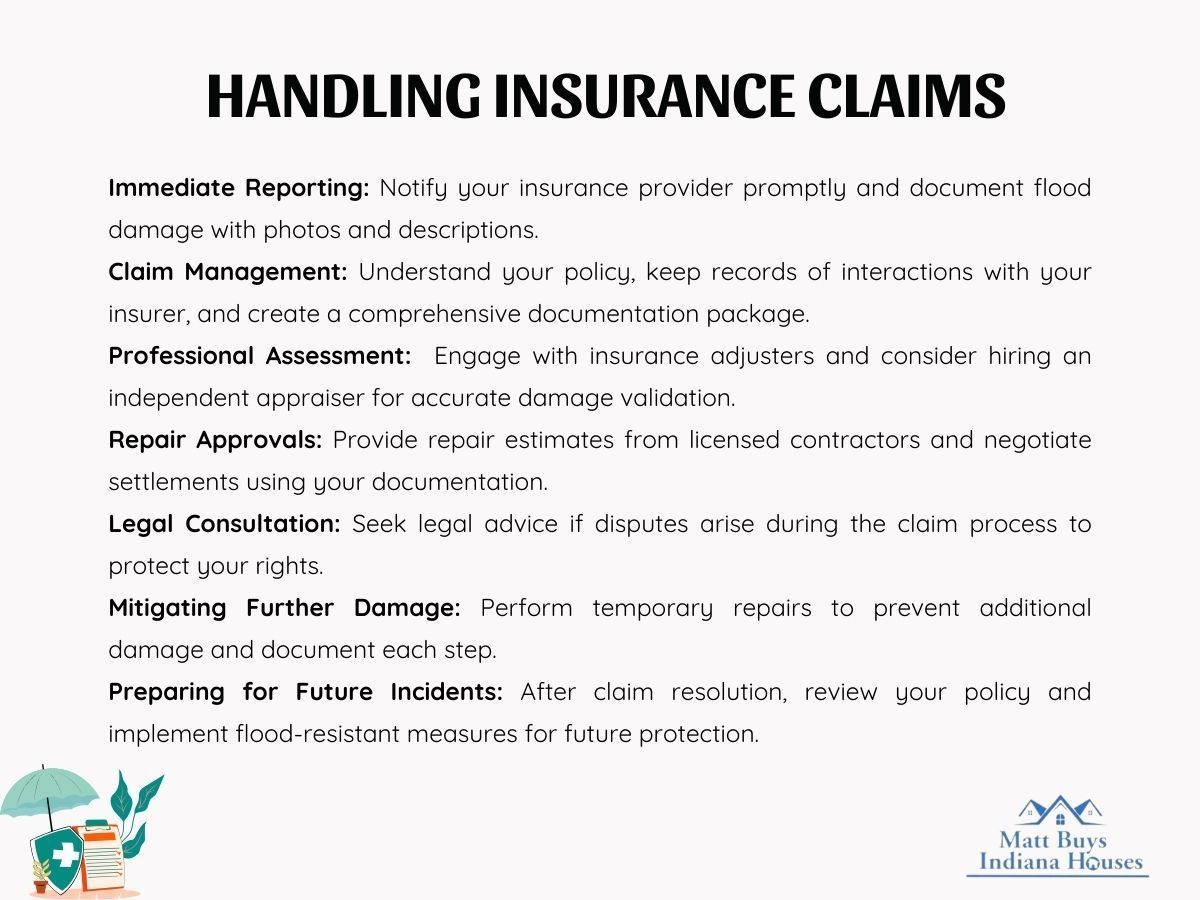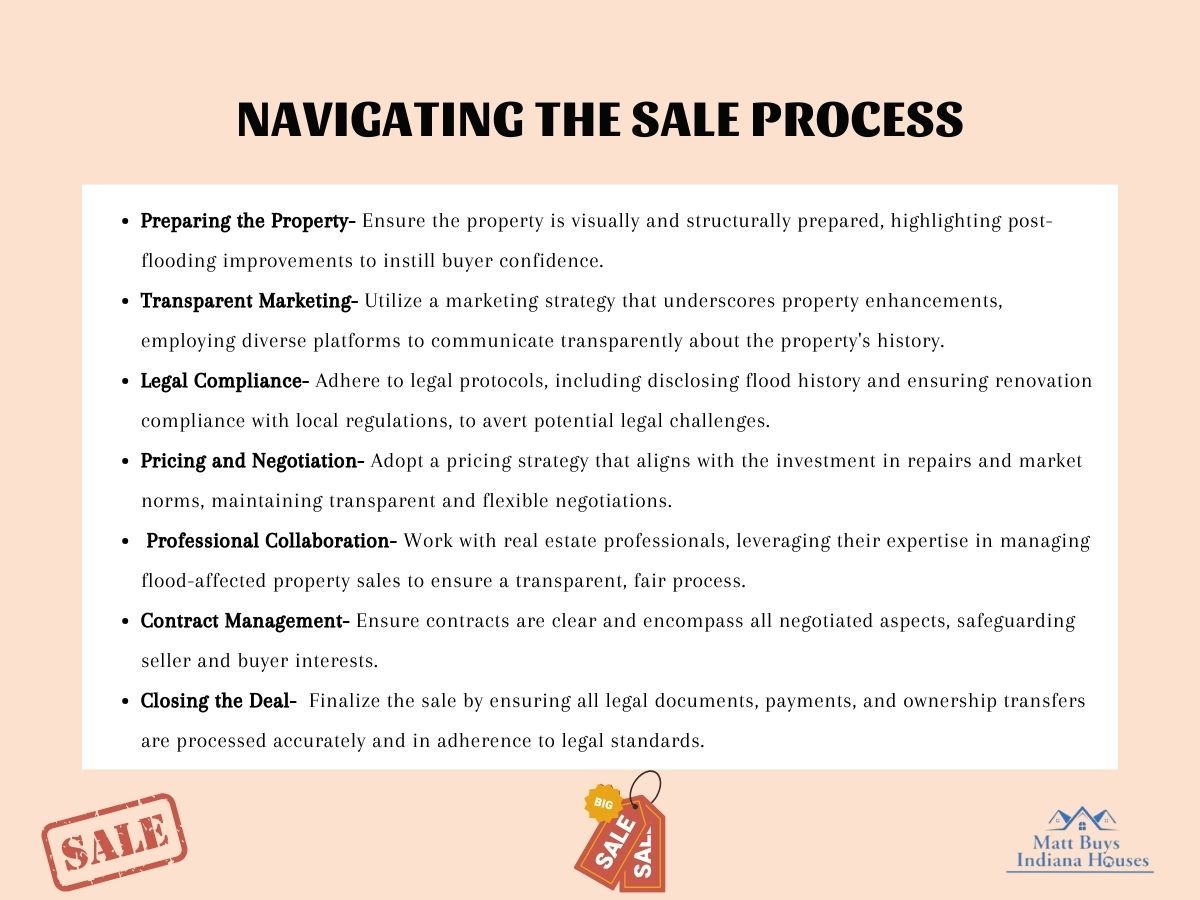A Guide to Selling Your Flooded House
October 13, 2023
In the aftermath of a flood, homeowners are often submerged in a sea of challenges and uncertainties, particularly when faced with the decision to sell a property that has borne the brunt of water damage. Navigating through the complexities of selling a flooded house can be akin to steering through murky waters.
Whether you aim to sell to conventional buyers or explore expedited sales through investors, this guide aims to illuminate a path through the process's practical, emotional, and legal intricacies, ensuring a well-informed and strategically planned sale journey.
Assessing the Damage
When a house has been flooded, the very fabric of the building is put under strain, and the overall integrity can be compromised. Addressing and assessing this damage is the pivotal first step in embarking upon the sales journey of such a property.
Let’s delve deeper into the essential facets of this process.
a. Professional Inspection
A critical initial step involves hiring a professional inspector to evaluate the property thoroughly. An inspector will help identify areas that need repair and create a detailed report, vital for insurance claims and potential buyers.
b. Mold and Mildew Inspection
Floodwaters often cause mold and mildew, creating an unhealthy living environment. Specialized professionals will need to perform tests to assess and resolve these issues.
Handling Insurance Claims
Dealing with insurance claims, particularly following the damage from a flood, can be a complex and at times, a daunting task. However, a strategic, well-organized approach can significantly streamline the process. Here’s a breakdown:

1. Immediate Reporting
Promptly notifying your insurance provider and documenting the initial flood damage is crucial. Utilize photographs and detailed descriptions to capture the immediate impact on the property.
2. Claim Management
Understanding your policy thoroughly and maintaining detailed records of all interactions and communications with the insurance company are pivotal to effectively managing your claim. Compile a robust documentation package, including visual evidence and professional evaluations.
3. Professional Assessment
Engage with insurance adjusters and consider hiring an independent appraiser to validate the damage and repair costs, ensuring a fair and well-supported claim.
4. Navigating Repair Approvals
Present your insurance company with several repair estimates from licensed contractors, and be prepared to negotiate settlements using your documentation as a bargaining tool.
5. Legal Consultation
In case of disputes during the claim process, legal advice can provide vital support in ensuring a fair resolution and protecting your policyholder's rights.
6. Mitigating Further Damage
Perform temporary repairs to prevent further damage, documenting each step while avoiding permanent repairs until the claim is settled to preserve the original damage assessment.
7. Preparing for Future Incidences
After claim resolution, reassess your insurance policy and implement measures to minimize damage in potential flooding events, such as adopting flood-resistant materials and strategies.
Handling insurance claims post-flooding involves a systematic approach from immediate response, through claim management and negotiations, to eventual resolution and future preparedness. A balance of timely action, professional engagement, and strategic foresight is essential to navigate the multifaceted process efficiently and effectively.
Legal Compliance and Ethical Considerations
Navigating through a flooded house's selling process involves logistical and financial considerations and necessitates stringent adherence to legal protocols and ethical norms. These elements are pivotal in safeguarding sellers against potential legal repercussions and ensuring buyers are treated fairly and transparently.
Full Disclosure
Legal protocols dictate that sellers disclose any known property issues, including flood damage, to prospective buyers. Full transparency ensures ethical dealings and mitigates potential legal complications.
Local Laws and Regulations
Ensure compliance with local laws and regulations regarding the sale of damaged properties, obtaining the necessary certifications, and ensuring adherence to zoning requirements.
Ethical Considerations
Ensure fair treatment of all potential buyers, providing equal information access and justifying the asking price with the property’s condition and market value.
Contractual Integrity
Ensure contracts accurately represent the property’s condition and any agreements, possibly utilizing a real estate attorney to confirm legal soundness.
Repair and Renovation Strategies
Strategic repairs and aesthetic renovations are pivotal when preparing a flooded house for sale. Initiating the process involves thoroughly assessing the damage and addressing visible and hidden issues like structural weaknesses and mold.
Engaging specialists ensures that repairs maintain the structural integrity and safety of the home. Additionally, aesthetic renovations, such as updating fixtures and landscaping, enhance the property's marketability. Implementing flood-resistant materials and techniques during renovations, like water-resistant paint, is also crucial to minimize future risks.
The transparent communication of these improvements to buyers showcases honesty and responsibility, making the property a viable, safe, and appealing option for prospective homeowners.
Marketing the Flooded House
Successfully marketing a house that has experienced flooding involves a blend of strategic, honest, and appealing promotional efforts to garner the interest of potential buyers.
It’s paramount to balance transparency regarding the property’s history and showcasing the remedial measures and renovations undertaken to enhance its value and safety.
a. Highlighting Renovations
Spotlight the structural and aesthetic upgrades through high-quality visuals and detailed descriptions in your marketing materials, elucidating the added value through repair and renovation works.
b. Transparency and Honesty
Openly disclose the home's flooding history in all marketing platforms to build trust and fulfill ethical and legal obligations towards potential buyers.
c. Targeted Marketing
Focus promotional endeavors on platforms frequented by potential buyers, such as investors or those seeking homes in the property’s locality.
d. Competitive Pricing
Position your pricing in alignment with the home’s condition and market rates, reflecting fairness and acknowledgment of its history.
e. Professional Staging
Employ staging services to enhance visual appeal, ensuring the property is presented optimally through photographs and viewings.
f. Utilizing Real Estate Professionals
Leverage the expertise of real estate experts familiar with marketing flood-affected properties to navigate pricing, strategy, and negotiations effectively.
g. Legal and Ethical Compliance
Adhere strictly to local laws and ethical norms in all marketing materials and strategies to safeguard against legal issues and maintain market reputation.
Marketing a flooded house pivots on a balanced approach that integrates transparent communication, emphasizes improvements, targets appropriate buyer demographics, and employs professional insights while maintaining strict compliance with legal and ethical guidelines.
Pricing Strategy
Crafting a pricing strategy for a flooded house necessitates a blend of thorough market analysis and acknowledgment of the property’s flood history.
Incorporating the costs of repairs and renovations into the asking price is crucial, yet maintaining an attractive price to potential buyers, considering the property's history is equally vital.
Transparent communication about the extent and quality of renovations and mitigation steps taken against future flooding can substantiate the asking price.
Flexibility in negotiations and utilizing the expertise of real estate professionals can further ensure that the pricing strategy reflects not only the home’s value and restoration efforts but is also aligned with market expectations and buyer apprehensions, thereby fostering a deal that offers fairness and satisfaction to all parties involved.
Navigating the Sale Process
Selling a house, particularly one with a history of flooding, encompasses various steps, each demanding specific attention and strategies to navigate efficiently and ethically through the sale process.

a. Preparing the Property
Ensure the property is visually and structurally prepared, highlighting post-flooding improvements to instill buyer confidence.
b. Transparent Marketing
Utilize a marketing strategy that underscores property enhancements, employing diverse platforms to communicate transparently about the property's history.
c. Legal Compliance
Adhere to legal protocols, including disclosing flood history and ensuring renovation compliance with local regulations, to avert potential legal challenges.
d. Pricing and Negotiation
Adopt a pricing strategy that aligns with the investment in repairs and market norms, maintaining transparent and flexible negotiations.
e. Professional Collaboration
Work with real estate professionals, leveraging their expertise in managing flood-affected property sales to ensure a transparent, fair process.
f. Contract Management
Ensure contracts are clear and encompass all negotiated aspects, safeguarding seller and buyer interests.
g. Closing the Deal
Finalize the sale by ensuring all legal documents, payments, and ownership transfers are processed accurately and in adherence to legal standards.
Effectively selling a flooded house involves a nuanced approach through each sale phase. From initial preparation to closing the deal, transparency, legal compliance, strategic pricing, and professional collaboration are pivotal in ensuring a successful, mutually beneficial sale.
Engaging with Real Estate Professionals
Involving real estate professionals in the sale of a flooded house is crucial for navigating the complexities of this specialized transaction. Agents and brokers provide vital insights into pricing, buyer pools, and effective marketing while leveraging their network to enhance your property's visibility to relevant buyers and investors.
Meanwhile, real estate attorneys ensure all disclosures and transactions strictly adhere to legal norms, protecting against potential legal challenges.
Engaging with such experts ensures that the sale process is not only navigated efficiently but is also backed by professional knowledge and expertise, thereby enhancing the likelihood of securing a fair, legitimate deal.
Managing Emotional and Financial Stress
Navigating the sale of a flooded house often involves a blend of emotional and financial stresses rooted in dealing with damage in the aftermath and ensuring fair financial returns. Addressing emotional distress may involve entrusting professionals to manage negotiation processes as intermediaries between sellers and potentially skeptical buyers.
Mitigating financial stress encompasses developing a solid pricing strategy, ideally with professional input, to balance recovering renovation investments with market-driven pricing. Exploring alternative sales avenues, such as targeting investors, may alleviate financial pressure by potentially hastening the sale process.
Coupling these strategies with a supportive network or professional counseling can facilitate a smoother, less stressful navigation through the emotional and financial intricacies of the sale.
Final Words
Navigating the intricacies of selling a flooded house unfolds a journey through emotional and practical complexities. This guide has endeavored to illuminate the multifaceted pathways, from addressing repairs and engaging in strategic pricing to navigating legal landscapes and working with professionals.
As you traverse through the negotiations, technical, and emotional aspects of the sale, let this guide be your beacon, steering you towards a successful, transparent, and ethical transaction, ensuring you navigate with preparation and strategy through every stage of the process.











